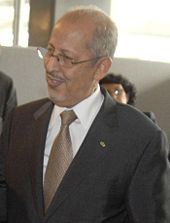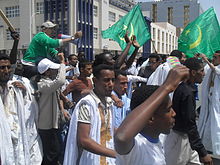Mauritania
It is bordered by the Atlantic Ocean to the west, Western Sahara to the north and northwest, Algeria to the northeast, Mali to the east and southeast, and Senegal to the southwest.[10][11][12] Despite an abundance of natural resources, including iron ore and petroleum, Mauritania remains poor; its economy is based primarily on agriculture, livestock, and fishing.The two territories do not overlap, though; historical Mauretania was considerably farther north than modern Mauritania, as it was spread out along the entire western half of the Mediterranean coast of Africa.[28] Through a combination of strategic alliances with Zawaya tribes and military pressure on the Hassane warrior nomads, he managed to extend French rule over the Mauritanian emirates.[30] After Mauritanian independence, larger numbers of indigenous sub-Saharan African peoples (Haalpulaar, Soninke, and Wolof) migrated into it, most of them settling in the area north of the Senegal River.[31][clarification needed][incomprehensible] The great Sahel droughts of the early 1970s caused massive devastation in Mauritania, exacerbating problems of poverty and conflict.Due to economic weakness, Mauritania has been a negligible player in the territorial dispute, with its official position being that it wishes for an expedient solution that is mutually agreeable to all parties.[34] In 1964, President Moktar Ould Daddah, originally installed by the French, formalized Mauritania as a one-party state with a new constitution, setting up an authoritarian presidential regime.He had brought the country to near-collapse through the disastrous war to annex the southern part of Western Sahara, framed as an attempt to create a "Greater Mauritania".Col. Mustafa Ould Salek's Military Committee for National Recovery junta proved incapable of either establishing a strong base of power or extracting the country from its destabilizing conflict with the Sahrawi resistance movement, the Polisario Front.[39] Following the incident, several riots erupted in Bakel, Dakar and other towns in Senegal, directed against the mainly Arabized Mauritanians who dominated the local retail business.As low scale conflict with Senegal continued into 1990/91, the Mauritanian government engaged in and encouraged acts of violence and seizures of property directed against the Halpularen ethnic group.Taking advantage of Ould Taya's attendance at the funeral of Saudi King Fahd, the military, including members of the presidential guard (BASEP), seized control of key points in the capital Nouakchott.[46]The Military Council later issued another statement naming Colonel Ould Mohamed Vall as president and director of the national police force, the Sûreté Nationale.Vall, once regarded as a firm ally of the now-ousted president, had aided Ould Taya in the coup that had originally brought him to power, and had later served as his Security Chief.The Army surrounded key government facilities, including the state television building, after the president fired senior officers, one of them the head of the presidential guards.The coup was coordinated by General Mohamed Ould Abdel Aziz, former chief of staff of the Mauritanian Army and head of the presidential guard, who had recently been fired.[53] A Mauritanian lawmaker, Mohammed Al Mukhtar, claimed that many of the country's people supported the takeover of a government that had become "an authoritarian regime" under a president who had "marginalized the majority in parliament".Domestically, a group of parties coalesced around Abdallahi to continue protesting the coup, which caused the junta to ban demonstrations and crack down on opposition activists.As a result, Abdallahi formally resigned under protest, as it became clear that some opposition forces had defected from him and most international players, notably including France and Algeria, now aligned with Abdel Aziz.[64] Mauritania lies in the western region of the continent of Africa, and is generally flat, its 1,030,700 square kilometers forming vast, arid plains broken by occasional ridges and clifflike outcroppings.The plateaus gradually descend toward the northeast to the barren El Djouf, or "Empty Quarter," a vast region of large sand dunes that merges into the Sahara Desert.Belts of natural vegetation, corresponding to the rainfall pattern, extend from east to west and range from traces of tropical forest along the Sénégal River to brush and savanna in the southeast.In March 1999, the government signed an agreement with a joint World Bank-International Monetary Fund mission on a $54 million enhanced structural adjustment facility (ESAF).[88] On 27 April 2018, the National Assembly passed a law that makes the death penalty mandatory for anyone convicted of "blasphemous speech" and acts deemed "sacrilegious".Sexism, racism, female genital mutilation, child labor, human trafficking, and the political marginalization of largely southern-based ethnic groups continued to be problems.[101][102][103] Amnesty International in 2008 alleged that torture was common in Mauritania, stating that its usage is "deeply anchored in the culture of the security forces", which use it "as a system of investigation and repression".[107][108] According to the US State Department 2010 Human Rights Report,[109] abuses in Mauritania include: mistreatment of detainees and prisoners; security force impunity; lengthy pretrial detention; harsh prison conditions; arbitrary arrest and detentions; limits on freedom of the press and assembly; corruption; discrimination against women; female genital mutilation (FGM); child marriage; political marginalization of southern-based ethnic groups; racial and ethnic discrimination; slavery and slavery-related practices; and child labor.Initiaves such as the United Nations Development Programme (UNDP) aim to address these human rights violations in line with the Sustainable Development Goals.Through the improvements to the blue economy and green energy transition, the UNDP strives to create employment opportunities, particularly for youth and women, who are underrepresented in the Mauritanian job market.[113] Mauritania ratified in 1961 the Forced Labour Convention, having already enshrined abolition of slavery, albeit implicitly, in its 1959 constitution;[112] although nominally abolished in 1981 by presidential decree, a criminal law against the ownership of slaves was enacted only in 2007.


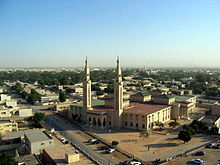
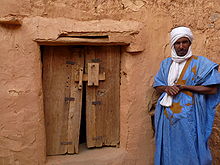
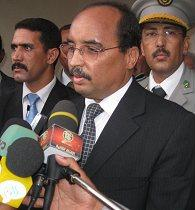
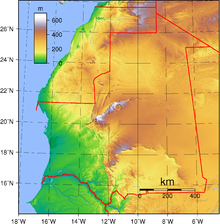







MauretaniaMauretania (disambiguation)MauritiusArabicNational Anthem of MauritaniaNouakchottPulaarSoninkeFrenchEthnic groupsHaratinBeidaneHalpulaarFulaniSunni IslamofficialDemonym(s)MauritanianGovernmentsemi-presidentialIslamic republicPresidentMohamed Ould GhazouaniPrime MinisterMokhtar Ould DjayPresident of the National AssemblyNational AssemblyFrancePopulationOuguiyaISO 3166 codeInternet TLDNorthwest AfricaWestern Saharathe northAlgeriathe northeastthe east and southeastSenegalthe southwestSaharaMaghrebcolonized by FranceFrench West Africa2008 Mauritanian coup d'étatMohamed Ould Abdel Aziz2019 electionshuman rights recordslaveryGlobal Slavery IndexArab worldArab LeagueSunni MuslimsArab identityBidhanArab-Berbersub-Saharan ethnic groupsBerberMediterraneanexonymMauri peopleXavier CoppolaniHistory of MauritaniaSahara DesertNiger-CongoBafourUmayyadsIslamic conquestsAlmoravidIberian PeninsulaGhana EmpireChar Bouba WarBeni Hassanupper stratumMoorishHassaniyaArabic dialectnomadicColonial MauritaniaPortuguese EmpireArguinPortuguesePrince Henry the Navigatorfeitorialaid claim to the territoriesSenegal RiverZawayaemiratesTrarzaBraknaTagantMaa al-AynaynprotectorateSaint-Louissub-Saharan AfricanHaalpulaarSahel droughtsArab nationalistarabizeMauritania–Senegal Border WarPolitical status of Western SaharaTiris al-GharbiyyaInternational Court of JusticeDeclaration on the Granting of Independence to Colonial Countries and PeoplesMoroccoPolisarioregional powerSahrawisSahrawi Arab Democratic RepublicHistory of Mauritania (1960–78)Mauritanian People's PartyMoktar Ould Daddahone-party stateconstitutionParti du Peuple Mauritanienone-party systemmultiparty democracybloodless coupsouthern partGreater MauritaniaChinguettiMustafa Ould SalekMilitary Committee for National RecoveryPolisario FrontMilitary Committee for National SalvationMohamed Khouna Ould Haidallah
